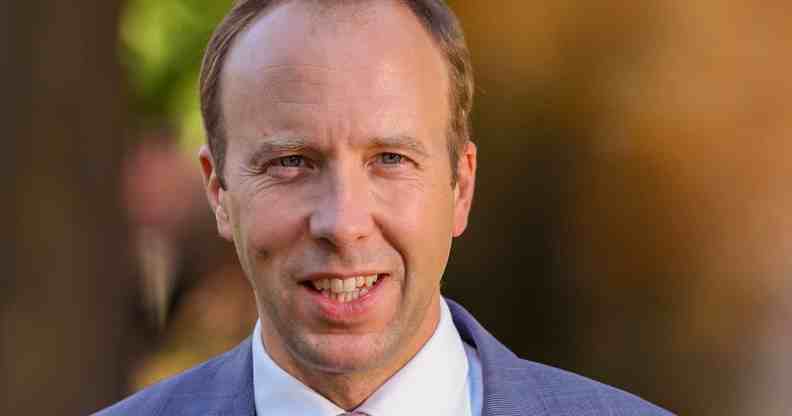Tory MP Matt Hancock invokes same-sex marriage in call to change law on assisted dying

Matt Hancock. (Vudi Xhymshiti/Anadolu Agency via Getty Images)
Matt Hancock has invoked marriage equality in a call for assisted dying reforms, calling on parliament to launch an inquiry.
Assisted dying generally refers to people choosing to peacefully end their own life with the help of another, often a healthcare professional.
Medical aid-in-dying is illegal in Britain, carrying up to a 14-year prison sentence under the 1961 Suicide Act.
But Hancock, the Conservative MP for West Suffolk, wants to change that. He compared the freedom for LGBTQ+ to be who they are to that of those who are on the threshold of death choosing when and how to end their lives.
He recalled the partial decriminalisation of homosexuality in 1967 and when parliament legalised marriage equality in England and Wales in 2013. (Though he failed to mention how the majority of Tories voted against it.)
“For 50 years, we’ve had a legal choice over who to love. For a decade, we’ve had a legal choice over who we can marry,” Hancock tweeted Tuesday (16 August).
“I’m calling for a Parliamentary inquiry & free vote on assisted dying.”
For 50 years, we've had a legal choice over who to love. For a decade, we've had a legal choice over who we can marry. I'm calling for a Parliamentary inquiry & free vote on assisted dying.
Read my piece with my constituent, David Minns, in The Express👇https://t.co/ZLgoel57lg pic.twitter.com/T3S7uhz8W0
— Matt Hancock (@MattHancock) August 16, 2022
Matt Hancock, who stood down as health secretary after steamy footage of him embracing a senior aide during lockdown surfaced, told the Daily Express he supports the wishes of one of his constituents to choose a medically assisted death.
“Both Conservative Party members and the wider public want to see an informed debate and a formal inquiry on assisted dying in the UK,” he said
Terminally ill cancer patient David Minns suffers from a rare condition called amyloidosis, a knock-on effect of his blood cancer that he left him frail and bed-bound.
Amyloidosis sees saw-toothed proteins build up and cut into people’s organs, such as the heart muscle and kidneys. Those with the disease often die within a year of getting a diagnosis.
Facing the loss of independence, dignity and quality of life, Minns said he wants to die on his own terms, rather than against his will.
“Why can’t we, in this day and age, be given the option of an assisted death – a calm, dignified exit, with our loved ones around us, and medical support?” he told the tabloid.
“I call on the next prime minister to listen to people like me and to ensure that an assisted dying bill that offers dying people choice can be properly considered by parliament.”
Seven in 10 Tory party members – the group who will pick Britain’s next prime minister – want the government to launch an inquiry on aid-in-dying, according to a 2019 poll by the charity Dignity in Dying.
In 2021, Baroness Meacher introduced an Assisted Dying Bill into the House of Lords. The bill would give terminally ill people who are of sound mind the choice to use prescribed, self-administered drugs to quickly and painlessly end their lives.
Campaigners say that with the right safeguards in place, assisted dying can help give terminally ill patients a sense of control over their lives at a time when they feel their life has been stripped of meaning.
Though Humanists UK, a charity representing non-religious Brits, criticised the bill, saying it would leave out people living with advanced forms of dementia and physical disabilities.
The British Medical Association has said it “neither supports nor opposes proposals to legalise physician-assisted dying in the UK”.
“Physician-assisted dying is a divisive issue and there are strong and diverse opinions in our membership and society. We will continue to represent our members, whatever their views on this topic,” John Chisholm, the association’s Medical Ethics Committee chair, said.
The Assisted Dying Bill has stalled in the upper chamber since.

